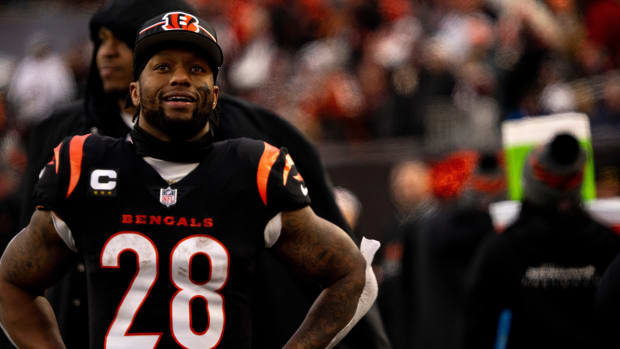
Fantasy Soccer: Why? Where? How?
Midway through the 2008-09 English Premier League season, Nate's friend decided he wanted to jump into our fantasy soccer league. It was really his first exposure to the English Premiership, but he had watched a few games and decided to give fantasy a shot.
In a salary-cap, cumulative scoring league with 30 members, Nate's friend ended the season 24th. Considering when he started, that is a pretty impressive feat -- especially for a new guy.
Like most fantasy sports, soccer is easy to learn and takes a little bit of research and luck to master. This step-by-step guide will provide EPL fantasy newbies with enough information to dive into the 2009-10 season.
Everyone knows soccer is the most popular sport in the world, so why isn't it the most popular fantasy sport? Its popularity is increasing in the states daily, and a first step to getting your feet wet in the sport would be by playing fantasy. Even if you don't like to watch soccer now, this could be your chance to enter the world of the hooligans and see what it's really like.
The EPL season runs from mid-August to the beginning of May. That is about 10 months of fun, intense fantasy soccer you could be playing, and it isn't strenuous at all.
The EPL contains all of the off-the-field banter, referee complaints, and media jumble to ample your soccer needs. There are the high-spenders (Manchester City), the illegal signers (Chelsea), and the team everyone loves to hate (Manchester United). The EPL also has some of the best talent in the world, which provides for weekly highlights of fantastic plays and goals, which will amaze you even if you have never played the sport.
Although the EPL is the national league of England, some of your favorite Americans can be seen in action. Brad Friedel (Aston Villa), Clint Dempsey (Fulham), Jonathan Spector (West Ham United), Jozy Altidore (Hull City), and Tim Howard (Everton) are some of the bigger names in the EPL that play on the U.S. men's national team.
Check any of your preconceived notions regarding soccer at the door. Now is the time to see what it's all about, and fantasy soccer is your first step. After watching an extra time game-winning goal in a thrilling 0-0 battle -- yes, we said thrilling -- you won't want to turn your back. The sport is alive, so give it a chance and see what it has to offer; you don't want miss the excitement of the final weeks of the EPL season. Fantasy soccer is a great way to gear up for the 2010 World Cup.
The most common fantasy soccer league is a salary cap league where each team owner gets 100 salary cap points to spend on a 15-player roster. The vast majority of these leagues have a cumulative scoring system where the league winner is the owner with the most overall points at the end of the season.
In a salary cap league, at the beginning of the season each team owner selects their team from the EPL pool of players. Each player is assigned a numerical value based on their ability. Owners must fill their roster without having their overall player value exceed 100.
Once the regular season starts, each owner is allowed to make one free "transfer" (a/k/a free-agent pickup) per week.
Some Web sites offer a standard draft league format, which is similar to fantasy football and baseball draft formats. In standard draft leagues each league owner is assigned a draft position and the owners select their teams based on that draft order.
The winner of draft leagues are determined by either a cumulative scoring system or a head-to-head system. Head-to-head leagues have weekly schedules where owners accumulate wins and losses based on their scoring in weekly matchups.
The major difference between salary cap leagues and draft leagues is that in salary cap leagues each team can use any player in the EPL, whereas in a draft league owners select from only the players on their roster.
Fantasy soccer scoring is usually pretty basic (e.g. goals, assists, saves, negative points for red and yellow cards) with a few interesting twists.
Obviously players earn points by scoring goals, but the value of each goal often depends on the player's position. For example in the official premierleague.com game, forwards earn four points for a goal, midfielders five, and defenders six. Defenders who score goals are valuable additions.
Assists usually carry the same point value (two or three points depending on what service you use) for each player.
Players also receive points for minutes played. Usually one point for starting the game, and then a second point for playing at least 60 minutes.
Goalkeepers pick up points for saves and clean sheets (this has nothing to do with how often they do their laundry; a clean sheet is also known as a shut out). In some leagues, defenders and midfielders will also earn points for clean sheets. At premierleague.com, defenders and goalkeepers earn four points per clean sheet, while midfielders pick up one.
Players lose points for yellow cards (usually minus-one) and red cards (minus-two).
Maybe the most intriguing scoring aspect in fantasy soccer is the bonus-point system. Bonus points are assigned to the top-three players in each game, as determined by Press Association analysts (premierleague.com). The NHL uses a similar system with their "Three Stars" program.
When choosing a league, we recommend looking for one that features bonus point scoring. Often times the best player on the field doesn't show up on the score sheet. It may be a shut-down defender or a playmaking midfielder, but a lot of the best players in soccer can't be measured by statistics. It would be like trying measure the best football running back without using yards or the best hitter in baseball without batting average or on-base percentage.
We don't recommend using complicated scoring systems. We've seen scoring that includes categories like completed passes, pass completion percentage, fouls, tackles, shots on goal, etc. Those categories have too many variables in my opinion (is a pass back to the goalkeeper really worth a point?). Keep it simple and the game will be a lot of fun.
The final scoring rule to be aware of is the "captain" system. In this system, team owners nominate one team captain each week. That player will receive double points for that week.
Once you understand your league type and scoring settings, the game becomes fairly simple.
As you can probably tell, our preferred fantasy soccer site is www.premierleague.com. Their standard scoring system has everything we look for in a league, like bonus points and the captain feature.
However, by no means are we endorsing premierleague.com as the end-all, be-all of fantasy soccer. ESPN.com and Yahoo! UK both offer EPL Fantasy Games. All of those are free services, so test them out and see what you like the best.
The EPL season is only one-third complete and it lasts until May. There is plenty of time to create a private league for a group of friends or join a public league and see how far up the table your team can advance.
Want to chat fantasy soccer or soccer in general? We're available at natepigott@rotoexperts.com and zdroik@rotoexperts.com.




































